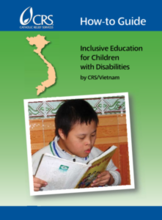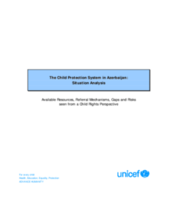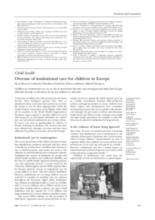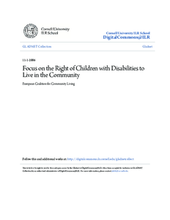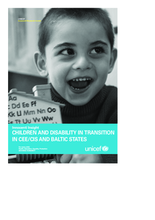Displaying 441 - 450 of 464
A ‘How-to’ Guide, based on the experiences of CRS/Vietnam, that provides practical strategies and steps developing countries can take to build inclusive education programmes for children with disabilities.
Analyzes emerging protection problems and priorities of children living in Azerbaijan. Drafts a map of the institutional system related to child welfare at a national level.
The Convention on the Rights of Persons with Disabilities is a human rights treaty establishing rights of persons with disabilities.
This document presents the full policy on the alternative care of children in Cambodia.
This article discusses the use of institutional care for children in Europe and shows that it remains common place despite the evidence of harm for children, including attachment disorder and developmental delay.
Advocates for the right of children with disabilities to live in the community. Provides recommendations on how to ensure a successful transition from institutional to community-based care. Focuses on the importance of family support and the right to education.
This report describes the findings of a two-year investigation in Turkey by Mental Disability Rights International (MDRI) and exposes the human rights abuses perpetrated against children and adults with mental disabilities. Locked away and out of public view, people with psychiatric disorders as well as people with intellectual disabilities are subjected to treatment practices that are tantamount to torture. Inhuman and degrading conditions of confinement are widespread throughout the Turkish mental health system.
Since 1986, American parents have adopted over 17,300 children from Guatemala. This study assessed the health, growth, and developmental status of 103 Guatemalan adopted children (48 girls; 55 boys) after arrival in the United States. Physical evidence suggestive of prenatal alcohol exposure and adequacy of vaccinations administered were also reviewed.
Report presents and analyzes new research and data around children with disabilities in the region, the effects of institutional care, and the need for family support services.
Documents a unique survey on the impact of AIDS on populations of disabled people. Particular emphasis on identifying disability-specific concerns.

